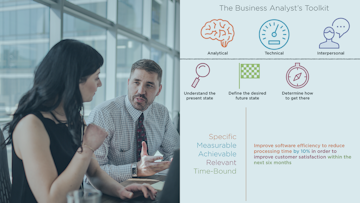
If you would like to be a business analyst or learn more about what business analysts do, you’ve come to the right place. In this course, So You Want to Be a Business Analyst, you will gain a foundational understanding of the value business analysts bring to organizations and the skills and traits that help them succeed. First, you will learn more about the lifecycle of business analysis, from assessing needs and working with stakeholders to developing requirements and coordinating with project managers. Next, you will explore the tools that successful business analysts use to conduct their work. Finally, you will discover how...
Read more
Good to know
Save this course
Activities
Career center
Project Manager
Business Analyst
Data Analyst
Business Process Analyst
Requirements Engineer
Systems Analyst
Consultant
Data Scientist
Machine Learning Engineer
Business Intelligence Analyst
Product Manager
Database Administrator
Web Developer
Information Security Analyst
Software Engineer
Reading list
Share
Similar courses
OpenCourser helps millions of learners each year. People visit us to learn workspace skills, ace their exams, and nurture their curiosity.
Our extensive catalog contains over 50,000 courses and twice as many books. Browse by search, by topic, or even by career interests. We'll match you to the right resources quickly.
Find this site helpful? Tell a friend about us.
We're supported by our community of learners. When you purchase or subscribe to courses and programs or purchase books, we may earn a commission from our partners.
Your purchases help us maintain our catalog and keep our servers humming without ads.
Thank you for supporting OpenCourser.


